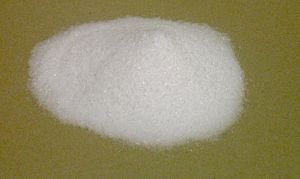One of the urban legends about legal methods of increasing a personal test score or an important race is to take bicarbonate of soda before a 2k erg test.
 Sodium bicarbonate, sodium hydrogencarbonate, sodium bicarb, “baking soda”, “bread soda”, “cooking soda” (Photo credit: Wikipedia)
Sodium bicarbonate, sodium hydrogencarbonate, sodium bicarb, “baking soda”, “bread soda”, “cooking soda” (Photo credit: Wikipedia)
Here’s a useful article that sets out how to calculate how much bicarb to take (body weight), and what the effects were on a test group of athletes.
The theory of baking soda
During intense exercise a significant proportion of the energy required for muscle contraction comes from anaerobic respiration. This is when you produce energy whilst having a limited oxygen supply. This has the negative effect of increasing cellular and blood acidity. High acidity limits the ability of your muscles to contract, meaning you slow down. Bicarbonate is an alkaline, meaning it will neutralise an acid. This is also referred to as a buffer (because it ‘buffers’ the effects of an acid). Bicarbonate is the body’s primary extra cellular (outside of cells) buffer. As such, ingesting bicarbonate before intensive exercise should increase the body’s buffering capacity (how much acid your body can buffer). So we may hypothesise that by consuming bicarbonate of soda before exercise, we can delay the point of slowing down (because our body will buffer the acidity for longer).
The side effects
Most athletes experience some bad side effects – principally runny tummy and cramps as a result. THis is well-known and puts many people off using bicarb.
I thought it interesting that the study scientists dissolved the bicarb in water. I’ve always heard that athletes swallow the powder insider gelatine caplets (as pharmaceutical medicines use). The large amount of water may make you feel bloated and I’m not sure an hour beforehand is enough time for the body to process the liquid into urine.
The outcome
Although they say the scores were ‘better’ but not statistically significant. Well, in my book, any improvement in a maximal output test score is a good thing – as an athlete I wouldn’t worry about the significance of the statistics – I only want to be able to submit a better score.
What do you think? Anyone tried this?
Enhanced by Zemanta







This Post Has 5 Comments
Just to put my pedant hat on for a moment…
“Not statistically significant” means that there wasn’t enough data to draw a conclusion – i.e. the conclusion is meaningless or unimportant. You might as well ask whether washing your lycra makes you go faster… You could do a 2k in dirty kit (7:20), followed by another one a couple of days later in clean kit (7:22). The first was clearly faster, but does this mean that clean kit makes you slower…?
So, taking the attitude that “as an athlete I wouldn’t worry about the significance of the statistics” is going to make you the person erging at the back of the room on your own because you believe that your stinky kit is going to make you a little bit quicker…
If the result is not significant then it’s meaningless – it means that they need to design better trials.
That’s not to say that taking bicarb doesn’t work though… lots of other studies have shown that it has a statistically significant effect on score outcomes (e.g. http://doctoroffitness.com/resources/fitness-articles/item/q-a-using-bicarbonate-to-buffer-lactic-acid-in-athletes-2)
Tom
*
Tom, I agree with you. ANYTHING that improves my score is of interest to me, as an athlete.
Do you know anyone who’s actually using bicarb who might be prepared to write about what it’s ACTUALLY like?
This won’t suit all athletes, as you say.
Aha but the caveat to this question is – is the all time club 2? record that you set on bicarbonate remembered as the night you violently and publicly soiled yourself on the rowing machine.
Lewin Hynes methinks mere details like that get lost in the mists of time. A record stands forever.
In all seriousness though I have set significant PBs on bicarbonate although I have also set significant PBs on beetroot and beta alanine. i have taken two weeks away from Caffeine only to pop four proplus pills 30 mins before the race. That one didn’t help particularly. The one constant between all these glorious high points in my indoor rowing career. …. a very high volume of structured training, on and off the erg.